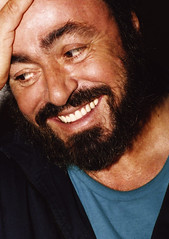
Luciano Pavarotti (1935-2007)
Although I didn't attend the actual concert on July 16, I had a more unique experience: I attended a dress rehearsal two days prior. Only 2,000 people were invited to the rehearsal. Most were friends and family of the vast orchestra and choir. So when a co-worker offered one of these precious tickets to me, I jumped at the chance.
It was a once-in-a-lifetime opportunity and I knew it. At the time, it would be only the third time that the three tenors had ever sung together (remember, prior to Carreras' near-fatal bout with leukemia in 1987, the three of them were considered rivals). The first Three Tenors concert was in Rome in 1990 (also for the World Cup). The second time they sang together was for Prince Rainier at a private charity benefit in Monte Carlo. At the time, we had no idea they would turn the Three Tenors event into a worldwide franchise a couple of years later.
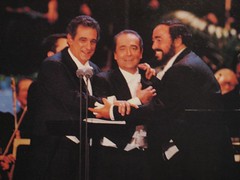
Plácido Domingo, José Carreras and Luciano Pavarotti. (07/16/1994)
The Los Angeles concert had been in the works for more than two years and was rumored to cost more than $10 Million to organize. The tenors only agreed when they learned that the World Cup would be in Los Angeles in July (all three are huge soccer fans). With all the work involved in putting together an event of this magnitude, I knew it wouldn't be happening again anytime soon.
I remember that they even offered $20 tickets when they announced the show two years prior. I still kick myself for not buying some. Then again, being a recent San Francisco-to-Los Angeles transplant, I didn't even know where I would be living in 1994.
I picked up the ticket after work and rushed to Dodger Stadium. I didn't even eat dinner — luckily some of the stadium concession stands were open, so I could at least get a hot dog and a Coke. It was a little baffling to see everyone eating hot dogs, nachos and beer while watching performances by the greatest tenors in the world.
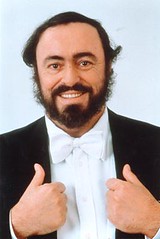
Surprisingly, he was the shyest one out of the three.
It was still daylight when I arrived at 7:30. The first thing I noticed was the enormous set. Later, I learned that it had been constructed a year prior in Hungary and shipped piece-by-piece to the U.S. Six months before the July event, crews constructed the set in an airline hangar to test that everything fits. At first it looked a little cheesy. Fake rock formations. A tropical rain forest backdrop. Artificial waterfalls. Plastic palm trees. But later, when the lights were shining on it, it came to life!
They only had the very front section open, so I took a seat in the tenth row, second section from the center. You could see everything, including Pavarotti's gleaming teeth.
The rehearsal, needless to say, was a fantastic opportunity! It was supposed to be a dress-rehearsal full run through, but it ended up being far more casual. The tenors were wearing their everyday clothes, and had no problem stopping and starting over again. This format really allowed their personalities to shine through. Carreras was by far the funniest. Domingo was the most professional. And Pavarotti was the shyest one, surprisingly (also the hardest to please).
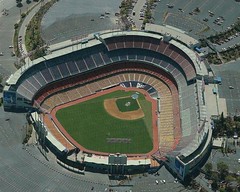
It was at Dodger Stadium I saw them perform.
The fact that Carerras was the funniest was surprising since at one time he was considered the most difficult. He was so funny! When the audience was applauding him, he would put his hands around his ears as if to say, "More! More! More!" There was even a point where the orchestra and the chorus did the wave in his honor.
Domingo's suave personality is apparent right away. When you saw him, you knew he was a class act. But he had a lighter side too. During the intermission, I saw him driving some friends around on a golf cart. Never thought I'd see that sight. The highlight of his performance was definitely "Granada," one of my favorite pieces.
But it was Pavarotti who was the most memorable. When he first came out, the audience went nuts with applause and cheers. Pavarotti just stood there, smiling broadly, relishing the moment (I’ll never forget that wide smile). When the applause finally died down, he gave us the first sample of his voice when he cleared his throat. The audience went wild again!
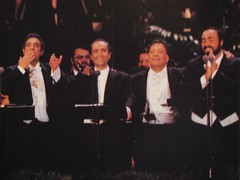
Domingo, Carreras, Mehta and Pavarotti. (07/16/1994)
What's interesting about Pavarotti is that he doesn't even read music. He learns everything by rote, which is both an advantage and a disadvantage. It's to his advantage in that he's the most natural singer of the three because he doesn't learn arias by notes — he learns them by phrases. He’s known for his phrasing. But his inability to read music is also a disadvantage in that all the music has to be taught to him. That's probably why he's such a perfectionist about the orchestra, because he can't use the sheet music as a guide. He relies only on what he hears.
Also, I don't want to diss Zubin Mehta, who is one of the most acclaimed conductors in the world. He alone was exciting to watch. Like Leonard Bernstein, Mehta used his whole body when he conducts.
The most interesting part of the evening was the interaction between the four men: the way they would all laugh together, or kid around, or ask the audience to sing along. It was really funny, and in that respect, I feel like I was taking part in something even more special than the official concert. The actual concert was much more formal, or at least that's how it appeared when I watched it on TV two days later (along with about a billion other people in more than 100 countries).
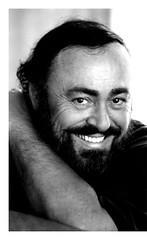
Thank you Pavarotti.
I felt truly overwhelmed that I was able to see them all sing in one night. Tenors of their magnitude come only once every 40 years or so. As I drove home after the rehearsal (attempting to sing some of the songs I had heard earlier) I drove away knowing that I witnessed something really special.
1 comment:
Wow! Sounds awesome, speaking as your roomate, which I was in 1994, all I can say is THANKS for inviting me along, ex-friend. =)
No, seriously, sounds like it was amazing. Ballpark food and opera...yum!
Post a Comment